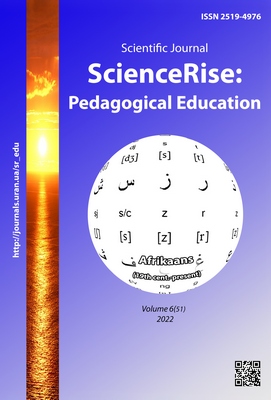Features of metacognitive beliefs of adolescents with a high level of personal anxiety
DOI:
https://doi.org/10.15587/2519-4984.2022.268177Keywords:
personal anxiety, metacognitions, anxiety symptoms, negative thoughts, metacognitive beliefsAbstract
The article contains an analysis of the problems of personal anxiety among adolescents. Anxiety is considered as a property of the personality, which is manifested in the cognitive aspect, emotional reaction, physical reaction and behavior of the individual. The general purpose of the study was to identify the metacognitive beliefs of adolescents with a high level of personal anxiety and was realized thanks to the implementation of such tasks as: identifying adolescents with a high level of personal anxiety, studying personal attitudes towards symptoms, determining and comparing the metacognitive beliefs of adolescents with different levels of personal anxiety, determining predictive power of metacognitions of young people with a high level of personal anxiety.
The results of a study of the prevalence of reactive and personal anxiety among adolescents are presented, a comparative analysis of one's own opinion regarding the presence of symptoms and test results of adolescents with a high level of personal anxiety is carried out. A new approach to the study of personal anxiety from the perspective of metacognitive beliefs is proposed, which is built on the principles of cognitive-behavioral psychology. Metacognition is defined as the basis of automatic thoughts, emotional and physical reactions, and the role of metacognitive processes in the interpretation of information about the level of security, the formation of judgments, assessments. The article proves that the metacognitions of adolescents with a high level of personal anxiety deprive them of flexibility in behavior, limiting the variability of life experience. The metacognitive portrait of young people with a high level of personal anxiety is characterized, in particular: the belief that anxiety is a protection against difficult emotions in anticipation of negative events; a positive attitude towards one's own anxious experiences is reinforced by a desire to prevent negative outcomes. As a result of the conducted research, the prospects for developing a method of targeted psychological influence within the cognitive-behavioral approach have been opened
References
- References
- Metcalfe, J. (2009). Metacognitive Judgments and Control of Study. Current Directions in Psychological Science, 18 (3), 159–163. doi: https://doi.org/10.1111/j.1467-8721.2009.01628.x
- Dotsevych, T. I. (2016). Metakohnityvna kompetentnist sub’iekta pedahohichnoi diialnosti u vyshchii shkoli. Kyiv, 42.
- Vatan, Yu. P. (2022). Structure and nature of metacognitive activity. Scientific Bulletin of Uzhhorod National University. Series: Psychology, 3, 10–14. doi: https://doi.org/10.32782/psy-visnyk/2021.3.2
- Brown, A. L. (1997). Knowing when, where, and how to remember: a problem of metacognition. Illinois, 152.
- Zaitseva, O. O. (2020). Motyvatsiini chynnyky rozvytku meta kohnityvnoi aktyvnosti u strukturi akademichnoi samorehuliatsii studentiv. Kharkiv, 228.
- Bokhonkova, Yu. O. (2020). Osobystisna tryvozhnist yak sotsialno-psykholohichna problema. Fundamental and applied research in the modern world. Boston: BoScience Publisher, 205.
- Haliieva, O. M. (2019). Conceptual differentiation of «worry» and «anxiety». Psychology and Social Work, 24 (1 (49)). doi: https://doi.org/10.18524/2707-0409.2019.1(49).185763
- Geiser, F., Kleiman, A., Albus, C., Conrad, R. (2012). Angststörungen. Der Internist, 53 (11), 1289–1295. doi: https://doi.org/10.1007/s00108-012-3069-7
- Levitt, E. E. (2015). The psychology of anxiety. Routledge, 187. doi: https://doi.org/10.4324/9781315673127
- Pauschardt, J., Remschmidt, H., Mattejat, F. (2010). Assessing child and adolescent anxiety in psychiatric samples with the Child Behavior Checklist. Journal of Anxiety Disorders, 24 (5), 461–467. doi: https://doi.org/10.1016/j.janxdis.2010.03.002
- Spielberger, C. D. (2013). Anxiety and behavior. Academic press, 413.
- Spielberger, C. D.; Spielberger, C. D. (Ed.) (2013). Conceptual and Methodological Issues in Anxiety Research. Anxiety: Current Trends in Theory and Research. Vol. 2, 481–493. doi: https://doi.org/10.1016/b978-0-12-657402-9.50013-2
- Zhyvtsova, H. A. (2021). Psykhokorektsiia tryvozhnosti zasobamy tilesno-oriientovanoi terapii. Kherson, 74.
- Petrenko, V. Ye. (2015). Psykholohichna korektsiia tryvozhnosti starshoklasnykiv riznykh typiv zahalnoosvitnikh navchalnykh zakladiv. Kyiv, 273.
- Dolhopolova, O. V., Tereshchenko, N. M. (2017). Kompleksna prohrama psykhokorektsii sotsialnoi tryvozhnosti v pidlitkiv. Naukovyi visnyk Khersonskoho derzhavnoho universytetu. Seriia: Psykholohichni nauky, 4 (2), 26–30.
- Werner-Seidler, A., Perry, Y., Calear, A. L., Newby, J. M., Christensen, H. (2017). School-based depression and anxiety prevention programs for young people: A systematic review and meta-analysis. Clinical Psychology Review, 51, 30–47. doi: https://doi.org/10.1016/j.cpr.2016.10.005
- Freud, S. (1922). The Unconscious. The Journal of Nervous and Mental Disease, 56 (3), 291–294. doi: https://doi.org/10.1097/00005053-192209000-00046
- Merlin, V. S. (2005). Psikhologiia individualnosti. Moscow, 542.
- Aseev, V. G., Elkonin, D. B., Davydov, V. V., Markova, A. K., Ilin, E. P., Kovalev, V. I., Khekkhauzen, Kh. (2018). Sootnoshenie motivatcii uspekha, boiazni neudachi i uspeshnosti uchebnoi deiatelnosti podrostkov, 30, 346.
- Brodovska, A. (2015). Do vyznachennia poniattia «tryvozhnist» u psykholohichnii literaturi. Psykholohichni pratsi, 21.
- Krasnova, V. V., Kholmogorova, A. B. (2011). Sotcialnaia trevozhnost i studencheskaia dezadaptatciia. Psikhologicheskaia nauka i obrazovanie, 1, 140–150.
- Holowka, D. W., Dugas, M. J., Francis, K., Laugesen, N. (2000). Measuring beliefs about worry: A psychometric evaluation of the Why Worry-II Questionnaire. Poster presented at the 34 Annual Convention of the Association for the Advancement of Behavior Therapy. New Orleans.
Downloads
Published
How to Cite
Issue
Section
License
Copyright (c) 2022 Olena Sereda

This work is licensed under a Creative Commons Attribution 4.0 International License.
Our journal abides by the Creative Commons CC BY copyright rights and permissions for open access journals.
Authors, who are published in this journal, agree to the following conditions:
1. The authors reserve the right to authorship of the work and pass the first publication right of this work to the journal under the terms of a Creative Commons CC BY, which allows others to freely distribute the published research with the obligatory reference to the authors of the original work and the first publication of the work in this journal.
2. The authors have the right to conclude separate supplement agreements that relate to non-exclusive work distribution in the form in which it has been published by the journal (for example, to upload the work to the online storage of the journal or publish it as part of a monograph), provided that the reference to the first publication of the work in this journal is included.







